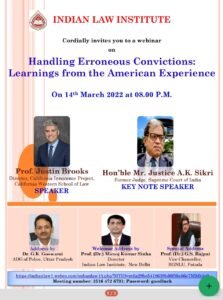International Conference at AGISS Research Institute Apply by 20 January 2024
Table of Contents
- ABOUT THE CONFERENCE
- ABOUT AGISS INSTITUTE
- THEMES AND SUB-THEMES
- SUB-THEMES
- SUBMISSION GUIDELINES
- PUBLICATION DETAILS
- PERKS
- IMPORTANT DATES
- PAYMENT DETAILS
- HOW TO REGISTER
ABOUT THE CONFERENCE
“The pace of change is accelerating at warp speed, buoyed by technological advances, communications, scientific achievements, globalism, and innovation…. the ability to obtain knowledge will be more indispensable than knowledge itself.” – Ferris Bueller
Demystifying the extract and construing the postulation with intellectual mastery is prudently an excellent hallmark in assimilating the holistic necessity of legal discourse. The integral outlook to encapsulate law and academia is a visible drift from lawyer centrist, provincial, labor-intensive guild to a customer-focused, global, digitized industry, and the transition indicates mustering ideological standpoints with reflective predictions. To connote these figurative matrices on a scholastic count, Our AGISS Research Institute is organizing an International Conference on “Human Rights and Constitution Law” in January 2024, with a principal objective to perceive the fundamental proportion of the Indian Constitution and Law of Human Rights.
The Conference assimilates to establish an advanced legal forum of professional erudition of international stance where the pursuit for the acquisition of knowledge and critical understandings of legality, shall reign supreme character with global participation, wherein Academicians, Legal Professionals, Research Scholars, Legal Draftsmen, Law Professors or Experts will scholarly collaborate for deliberations and interventions about the historical evolution of constitution or constitutional doctrines, to examine methods of construing the meaning of constitutional provisions, and to articulate a coherent set of opinions and prospects on significant, vital, controversial and current constitutional issues or dimensions, and also for expounding the regime, genesis and metamorphosis of Human Rights with a crucial approach to evolve interconnections with the global and regional mechanisms for the protection of Human Rights.
The Objective of the Conference is to substantially captivate the audience and participants, to engineer a holistic background to broadly inculcate inter-disciplinary leanings and applications of law in social-economic-political-ecological perspectives and to foster research temperament in legal pursuits, specifically concerning Constitution and Human Rights.
- To examine the historical evolution of constitutional doctrines, standards, and tests.
- To encompass International Human Rights Law, norms, and practice and comprehend the Charter and Treaty System, including the Universal Declaration of Human Rights, 1948.
- To explore the metamorphosis of Human rights law and its historical perspectives, structural principles, and right to development.
- To understand contemporary judicial thinking in the era of judicial activism.
- To understand the inter-relationship between human rights regimes and humanitarian intervention for the maintenance of peace and security.
- To perceive the significance of fundamental rights and the role of the judiciary in safeguarding them.
- To critically analyze the existing international legal framework for the protection of Human Rights.
- To understand the constitutional provisions governing legislative, administrative, and fiscal relations between centre and state.
- To determine and critically analyse several issues and challenges about Human Rights, including liberty and security during a state emergency, terrorism, and globalization.
- To develop an enhanced understanding of precedents in the interpretation of laws and to apply the constitutional principles to hypothetical or real problems or contemporary constitutional challenges and issues that are being faced by our citizens today.
ABOUT AGISS INSTITUTE
AGISS Research Institute is an Independent, Non-partisan, Non-profit public policy organization. We aim to conduct High-Quality research so that governing bodies can make better decisions. We believe in strengthening Democracy, fostering economic and Social Welfare, Security and Opportunity for all so that we make the world a better place for all of us and the generations to come. AGISS as a trust under the Indian Trust Act, of 1882. This project of setting think tank was undertaken to fill the vacuum that has arisen in the field of law due to limited research by several organizations and with the guidance of several Retired Justices of the Honorable Supreme Court of India and High Court of various states and RETD. Members of Tribunals also expressed several similar thoughts about the need for good research in several areas of the legal field.
THEMES AND SUB-THEMES
THEME: HUMAN RIGHTS AND CONSTITUTIONAL LAW
SUB-THEMES
- Human rights and constitutional protection.
- Constitutional guarantees of human rights.
- International human rights law.
- National human rights Institutions.
- Equality and non-discrimination.
- Freedom of expression and assembly.
- Role of constitutional courts in protecting human rights.
- Judicial review of legislation.
- Constitutional remedies for human rights violations.
- Reparations for victims.
- Human rights and democratic governance.
- The relationship between human rights and the rule of law.
- Promoting human rights in democratic processes.
- Public participation and human rights.
- Human rights and constitutional challenges.
- Balancing human rights with national security.
- The intersection of human rights and technology.
- Addressing new and emerging human rights issues.
- Confronting discrimination and inequality.
- Human rights and constitutional reform.
- Focusing on the importance of human rights education, capacity-building, and community engagement in promoting a culture of human rights.
- Constitutional reform processes for enhancing human rights.
- Constitutional amendments to strengthen human rights protection.
- Public engagement in constitution reforms.
- Human rights and constitutional education.
- Incorporating human rights education in school curricula.
- Promoting constitutional literacy.
- Capacity-building for human rights defenders.
- Human rights training for judicial officers.
- Human rights and constitutional development
- Human rights and sustainable development goals,
- The role of constitutional law in advancing economic, social, and cultural rights through constitutional frameworks.
- Constitutional guarantees of civil rights and liberties.
- Protection of minority rights.
- Constitutional protections for vulnerable groups.
- Constitutional responses to national emergencies.
- Constitutional challenges in the digital age.
- Constitutional implications of globalization, migration, and citizenship.
- Constitutional protection of the environment.
- Constitutionalism and Transitional Justice
- Constitutional guarantees of transitional justice
- Truth commissions
- Accountability for human rights violations
- Reconciliation processes
- Dealing with the legacy of authoritarian regimes.
- Equality and Non-Discrimination.
- Exploring issues related to gender, race, ethnicity, religion, disability, and other forms of discrimination.
- Discussing strategies for achieving equality and combating discrimination.
- Freedom of Expression and Access to Information.
- Examining the importance of freedom of speech, press freedom, and the right to information in upholding human rights and democratic societies.
- Human Rights and Technology.
- Analyzing the impact of technology on human rights, including issues such as online privacy, surveillance, artificial intelligence, and the right to digital access.
- Social and Economic Rights
- Addressing issues related to poverty, socio-economic inequality, access to education, healthcare, and social protection, and discussing strategies for enhancing social and economic rights.
- Human Rights and the Environment.
- Exploring the intersection between human rights and environmental protection, including topics such as the right to a clean and healthy environment, climate justice, and the rights of indigenous peoples.
- Human Rights in Conflict and Post-Conflict Situations.
- Examining human rights violations in conflict zones.
- The role of transitional justice.
- The protection of vulnerable groups during and after armed conflicts.
- Human Rights and Migration.
- Discussing the rights of migrants, refugees, and internally displaced persons (IDPs), exploring the challenges they face.
- Highlighting the importance of protection and comprehensive migration policies.
- Ensuring Accountability and Access to Justice.
- Analyzing mechanisms for holding states and non-state actors
- accountable for human rights violations.
- Discussing the role of international and domestic courts and addressing the challenges in ensuring access to justice for victims.
- Human Rights Education and Advocacy.
- Including the role of civil society organizations and grassroots activism.
SUBMISSION GUIDELINES
- Kindly do not submit the same paper at any journals/conferences/ seminars etc.
- The submission must be an original work of the authors i.e. the paper shouldn’t be plagiarized and it should be free from grammatical, spelling, and other errors. It must not contain any defamatory words.
- The submissions should be unpublished.
- The author is required to include the declaration form stating that his work is original and hasn’t been published anywhere.
- Submission must be accompanied by an abstract of not more than 500 words and author(s) affiliation. No paper will be accepted without an abstract.
- Co-authorship of 2 or more authors is allowed.
- Author’s info to be attached:
- Name of the Author(s)
- Qualification
- Name of the Institution/Organization
- Email ID & Phone Number
- Submissions will be subjected to a plagiarism check during the initial scrutinization process.
- The Submission should be made in .doc/.docx format only.
- The word limit for abstracts should be between 250-500 words.
- All abstracts will be accepted subject to review and modification.
- The Indian Law Institute (ILI) rule of footnoting and citation style should strictly be followed in the submissions, non-compliance to this will lead to it being summarily rejected.
- The word limit for research papers is 3000-6000 words (maximum, excluding footnotes).
- The body of the paper should be in Times New Roman, with font size 12 and 1. Line spacing.
- Footnotes should be in Times New Roman, size 10 with single line spacing.
- Page borders should not be used.
- The email should entail the following:
- Abstract (without the author’s details).
- Cover Letter [with the name(s), institutional affiliation(s), and contact details of the author(s)]
- Abstracts and research papers should strictly be submitted at Google Form Link only. Notification of the selection of abstracts shall be sent to the participants within two or three days from the date of submission of abstracts.
NOTE: You may present your ppt with the rough draft of your paper.
PUBLICATION DETAILS
- AGISS Research Institute shall select remarkable papers presented during the Conference, post the successful conclusion of the review process.
- Subsequently, the selected articles shall be published in a Book
- Rest of the articles shall be published in the articles section of the website of our Think Tank.
- Certainty of publication of all papers received either in the book or in article section of Think Tank.
PERKS
- Certificate of Presentation to all who will present
- Certificate of Participation to all who will attend it.
- Certificate of Appreciation for the Best Presentation.
IMPORTANT DATES
- Last date for Abstract Submission & Registration: 20th January, 2024 (till 11:59 PM IST)
- Final notification of selected abstracts: within 48 hours of abstract submission
- Last date of Registration as an attendee/participant: 20th January, 2024 (till 11:59 PM IST)
- Last date for Submission of the Full paper: 28th February, 2024 (till 11:59 PM IST)
- Conference date: 28th January, 2024
REGISTRATION DETAILS
- Paper presentation/ Submission/ Registration fees for Students/ Researchers:
- Single Author: Rs. 1,000/- INR
- Co-Author (2 or more): Rs. 1200/- INR
- Paper presentation/ Submission/ Registration fees for Professionals /Academicians:
- Single Author: Rs. 1,200/- INR
- Co-Author (2 or more): Rs. 2,000/- INR
- Foreign Nationals:
- Single Author: $ 30/- (30 US Dollars)
- Co-Author (2 or more): $ 50/- (50 US Dollars)
- Participation/ attending the Panel discussions for Students/ professionals: Rs. 1,200/- INR (and for Foreign Nationals US $ 30/-) per candidate, where the attendees will be a part of the discussion and they will be able to ask their questions to the panel.
Please Note that in case the co-authorship is a combination of a national student/professional and a foreign student/professional, then the registration fees to be paid will be the Co-authorship of professionals.
PAYMENT DETAILS
A/C Holder: AGISS Research Institute
A/C No. Current A/C No. 326621010000045
Bank Name: Union Bank of India
Branch Name: Faridabad, Green field Branch
IFSC: UBIN0932663
HOW TO REGISTER
For Abstract submission/to register as a presenter for presentation, click here:
https://forms.gle/nMPnyTcPuTZBaSZf7
To register as an attendee/participant, click here:
https://forms.gle/oTxvJLdubAMktHgt5
Previous Posts
Research Assistant – Department for Promotion of Industry and Internal Trade (DPIIT) IPR Chair
NSS Cell, CNLU organises a National Webinar on “Constitutional Law in the Digital Age”
GCRCJS International Conference on Crime & Technology: Prospects & Challenges
Law Officer at the National Anti-Doping Agency, New Delhi
Internship Opportunity at Abhidhvaj Law Journal (ALJ) – December 2023
Keywords
AGISS Research Institute, International Conference at AGISS Research Institute Apply by 20 January 2024, International Conference at AGISS Research Institute, International Conference at AGISS,




